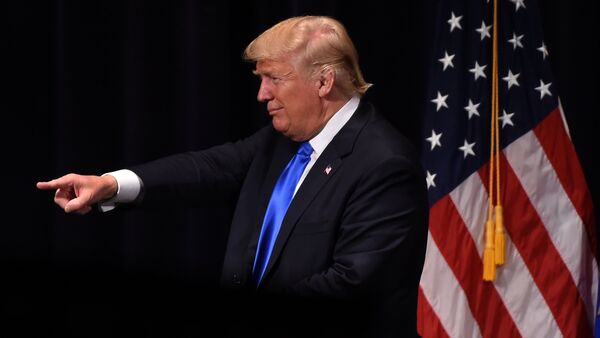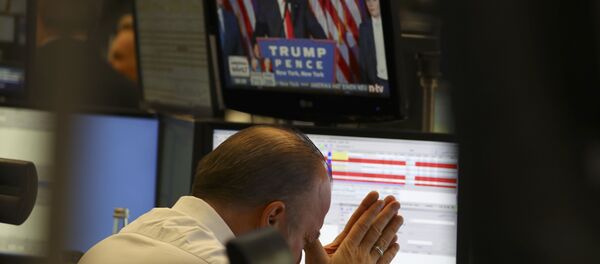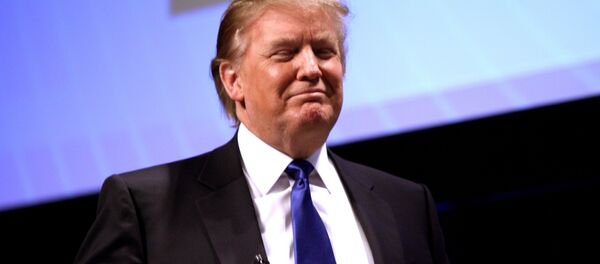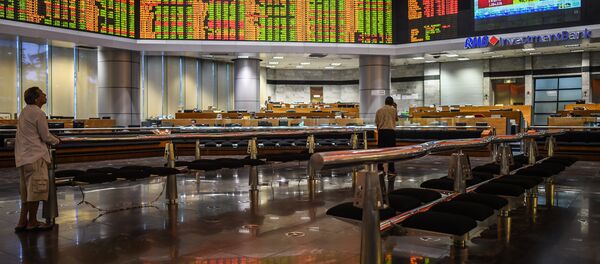Trump’s projected measures aimed at economic reform and a greater degree of isolation of the US from international trade are seen as accelerating US inflation and growth, thus rendering higher-yielding and more volatile assets more attractive in the eyes of market participants.
On Thursday alone, the capitalisation of international bond markets dropped by $450 bln, and the losses amounted to above $1 trln by late Friday. The drop in prices on 10-year US Treasury note pushed the yield to 2.15pc, breaking the critical ceiling of 2pc first time since January, when the yield was retreating in the wake of the Fed hike-triggered bloodbath in stocks.
"It would only take a 100 basis point rise in Treasury bond yields to trigger the worst price decline in bonds since the 1981 bond market crash", Ray Dalio of Bridgewater Associates, a Westport, CT-based investment management firm, said.
Simultaneously, global equities gained some $1.3 trln over the same period, with capital arriving from the currency market, as well as from the battered fixed-income portfolios, according to Bank of America Merrill Lynch data.
"We do view the election of Donald Trump as a game changer," Adam Donaldson of Sydney-based Commonwealth Bank of Australia said. "The strong bias toward fiscal expansion and inflationary policy represents a stark change to the malaise of recent years. This opens the door for the Fed to hike in December, but also more quickly in 2017 and 2018 than previously expected."
The important thing is, when US Treasury yields rise due to market moves, as it is happening now, the ‘natural interest rate’ – a projection of commercial borrowing costs in the US – rises as well, putting additional pressure on the Fed to address the mounting imbalances with a rate hike.
"Of course we will watch events and depending on how the market turns out and how the economy turns out we will adjust our policy if we think that's necessary," Fischer said during a central banking conference in Santiago, Chile. "In my view, the prospects of a continued steady expansion in the U.S. economy are maximized to the extent that we proceed with a gradual removal of accommodation," he added.
What it means for the financial markets and for the broader economy is more expensive credit, and lower availability of financing, which might affect the pace of economic growth in the short-term. The US GDP growth rose to 2.9pc year-on-year in Q3 from roughly 1pc for three previous quarters.
Meanwhile, as the government is poised to boost borrowing in order to finance their fiscal stimulus program, the supply of US Treasury notes in the market will increase, resulting in further declines in the bonds’ value and even higher yields.
"Deficits were already starting to track up, and they could do more depending on policy decisions," Jay Mueller of Wells Capital Management said.
This means an even greater upward pressure on ‘natural interest rate’, and the Fed will have to hike their rates at a quicker pace in order to catch on with the market dynamics. A faster normalisation in monetary policies would result in greater sustainability in the economy, whilst the declining value of US Treasuries would mean a cheaper US debt, easing its overall burden somewhat.
All these observations pretty much fall in line with Trump’s campaign rhetoric of ‘paying off the US debt’ eventually.






